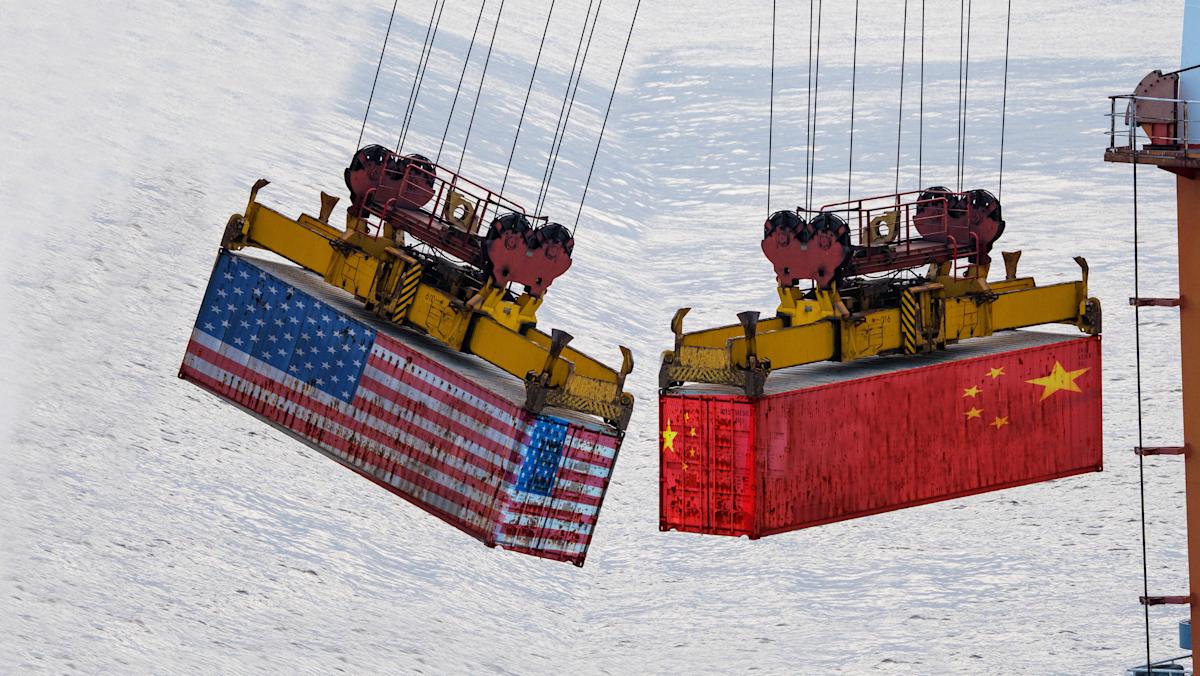00:00 Speaker A
Well, most investors looked for clarity about where President Trump’s trade agenda was heading. Our next guest accurately predicted that Trump’s tariffs were really all about China. Joining us now, David Wu, a former top Wall Street global macro strategist, current CEO of David Wu Unbound where David publishes his research. And David, you accurately predicted a few days ago that the entire trade war would be about China. What is your message to investors about where we head from here then, given that clarity?
00:42 David Wu
Yeah, I think, I think, I think that’s the thing. I think, you know, the point here is that not only, I think, this whole entire trade war, the prime target was China, but rather, I think, at this point, I think, safe to say that the entire trade war has been designed by the architect of the Trump’s trade war to literally deal a blow to the Chinese economy so hard that China would no longer be able to threaten the US hegemony. In fact, if you think about this, 125% tariff, I mean, we were to apply the sort of the traditional estimate on the price elasticity of imports, okay? This will suggest that with this tariff, Chinese exports to US will go to zero. We’re not talking about down 30%, 40%. We’ll literally go to zero over time. So I think from that point of view, there’s no doubt. I think the Chinese are waking up to this realization, which is that this is not just a trade war. That this goes way beyond it. And I think my view is that the deep seek news in many ways, two months ago, have only galvanized the China hawks in Washington who believe that literally that China is an existential threat that has to be dealt with urgently. And I think these people right now, no doubt, are in the driver’s seat.
03:27 Speaker A
So David, what investment thesis does the scenarios you just laid out create?
03:40 David Wu
I think right now, obviously, there’s no doubt. I mean, this is where there’ll be several rounds. This very first round, I would say, Trump won. No doubt about that, especially given I think Trump has access. If there’s one success we can attribute to Trump, is the fact he’s actually isolated China. The fact is that today, as you know, the European Union has basically decided to postpone the imposition of the $26 billion tariff that they only approved yesterday by 90 days, okay? And moreover, Japan and South Korea have denied that they were ever in negotiation with China about basically doing a free trade zone, okay? Even Brazil and India that are members of the BRICS have basically come out essentially closing the door on cooperation with China. So, and so forth. So I would say China definitely is very isolated at this point. The question then is what does China do? Because I think Xi Jinping right now has only two choices. Either he accepts defeat and sue for peace, or he really steps it up and try to punch back in some other way that’s not economic. Okay? And I think that’s really the issue and this is the reason why gold prices has done so well because I think the consequence of this trade war is that geopolitical risk has risen sharply.
06:02 Speaker A
So David, what does China do next to retaliate? What are their options?
06:09 David Wu
I think there are, there are several options. None of which is very pleasant, but let’s just say but I think an economic realm, they don’t really have many options, right? Because even when it comes to like selling Treasuries, I mean, let’s be honest, most of central banks’ holding of Treasuries are housed at the New York Fed. I’m telling you at the first time that China’s trying to liquidate the treasure holdings. I mean, China run the risk of having their holdings being frozen by by by by the New York Fed or by Trump and so on. And so on. And they know that. So that’s not really the thing to do. And then also because, I mean, Chinese imports from the US has been falling over the last five years. So that even today like China’s, you know, China only imports about 20% of US export of soybeans, okay? So even there, I would say China doesn’t have that much leverage. Again, I think I’m thinking in geopolitical terms what China can do to potentially hurt the US. I think one country that comes to mind obviously is Iran. Mhm. As you know, the US will be meeting with Iran, okay, on Saturday. And Trump says that he’s optimistic that the two countries are moving forward in terms of averting US bombing of Iran’s nuclear facility. As you know, China is Iran’s largest oil, you know, basically importer. Right. About 99% of Iranian oil goes to basically China. China has a security agreement with Iran. China is Iran’s arguably biggest backer. If I’m China right now, I might not want to basically, I want to basically bolster Iran’s back, you know, in order to basically use Iran as a leverage in my negotiation with Trump. Yeah. So I would argue, all else being equal, I think the situation between US and China today means less likely that you’re going to see the Iranian signaling any kind of willingness to negotiate with Trump this Saturday, which I think’s bullish for oil in the short. Yeah. I think they are, of course, is Taiwan.
10:08 Speaker A
Sorry to interrupt you, but we’ve got 30 seconds left and I want to get your picks for our investor audience listening. How should investors be investing off of the ideas that you’re laying out? 30 seconds.
10:21 David Wu
Yeah. So I, I like gold. I think gold could potentially go even higher because I think a lot of central banks are going to be diversifying out of dollar into gold. That would be the right thing to do. I think the second thing is I think defense stocks are going to be very attractive as you know, like I think as the China hawks, the Russia hawks, you know, essentially make a comeback in Washington, already Senate and in the house, both want to increase defense spending. This is very bullish for defense stocks. Thirdly, if you really like the idea of basically reshoring of US manufacturing and so on and so forth, I think something like a Rockwell or ABB, which are sort of leading providers of automation in manufacturing, I think, are pretty, I think, look pretty good at least on a medium term basis.







